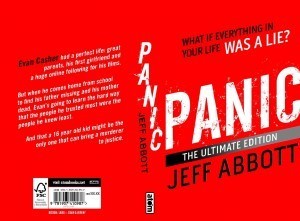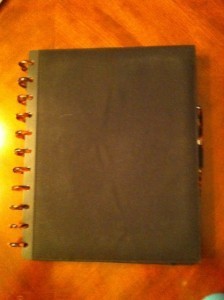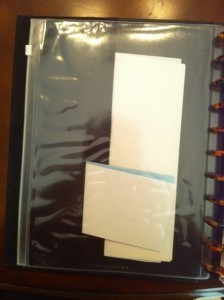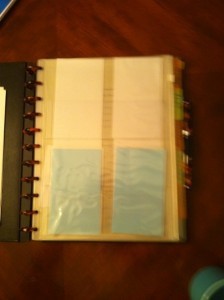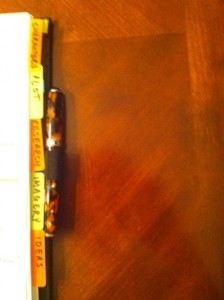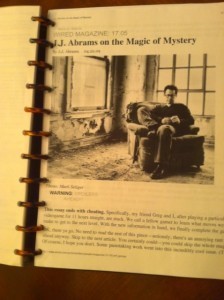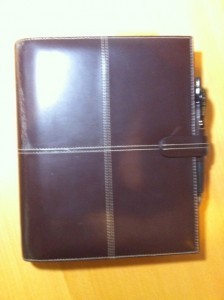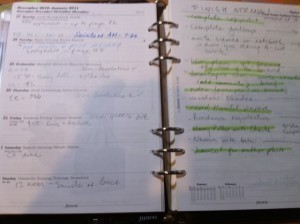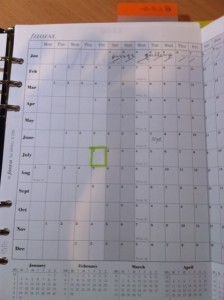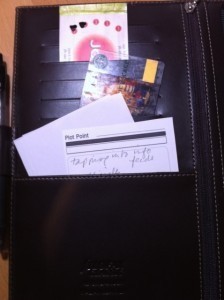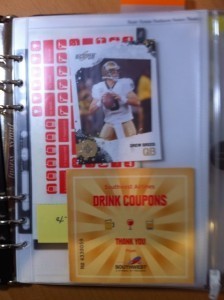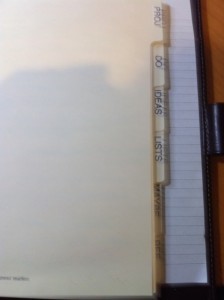Jeff Abbott's Blog, page 3
April 13, 2011
What I've Been Watching

Portrait of Dirk Tybis Watching a 3-D TV, after Hans Holbein the Younger, a photo by Mike Licht, NotionsCapital.com on Flickr.
Another Facebook reader wanted to know what TV shows I've been watching. So here's a short list of some recent favorites:
Arrested Development — an absolutely brilliant comedy about a dysfunctional wealthy family whose patriarch is arrested for fraud and "light treason", and must rally together to save the family business, led by Michael (Jason Bateman), the one "responsible" member of the family. Might be the best American comedy ever, and it's just a crime that it only had three seasons. My highest recommendation. Do not get Harlan Coben and I started on this show, we will wax rhapsodic about it. Available on Netflix streaming.
Blackadder — I had seen an episode or two of this British classic back in the 1980s when it first aired, but had never watched the whole series (which consists of four six-episode seasons, each season set in a different time period.) Throughout history, Edmund Blackadder (Rowan Atkinson) along with his idiot servant Baldrick (Tony Robinson), has schemed and plotted to win power and fortune, and failed, with spectacularly funny results. One of the snarkiest shows on television. You get to see Stephen Fry, Hugh Laurie, and Miranda Richardson in early, very funny roles. Available on Netflix streaming.
Dexter — probably my favorite drama. It's a fantastic character study of a man who believes he is a monster and struggles to be human like the rest of us. I came to this show a bit late but when I start watching a season I generally have to stop doing whatever else I'm doing to devote my full attention to it. The entire cast is fantastic, especially Michael C Hall.
Breaking Bad — the inverse of Dexter: we see the destruction of a good man into a bad one. Terminally ill high school chemistry teacher Walter White (Bryan Cranston) decides to become a meth manufacturer to make a fortune for his family before he dies. Watching this family man turn into a criminal mastermind is just gripping, all while trying to keep his illness and his illicit activities from his family. Walter's relationship with Jesse (Aaron Paul), a former student of his who draws him into the meth world, may be the most bizarre father/son connection going on TV, and both actors have deservedly won Emmys for their work. The final hour of Season 2 may be one of the most gripping hours of television ever; the ending will just shatter you. I have to catch up with this on for Season 3.
Entourage — the big surprise is that my wife enjoys watching this very male, clubby show with me. While I think some seasons have been uneven, I love Jeremy Piven as superagent Ari Gold, who has a bigger heart than he will ever admit. It is also brutally honest about male friendships.
Battlestar Galactica — I only tried this because so many writer friends praised it so highly. They're right. It's a devastating examination of war, survival, love, and honor, told on an epic scale. Few dramas have explored the post 9/11 world as strongly as this one: religious extremism, suicide bombers, the corrosive effects of power, bigotry, how we change the values we claim to live by in the face of imminent doom. The acting is very high-quality, especially from Mary McDonnell and Edward James Olmos. Favorite moment: The famous "I'm coming for all of you" scene, when McDonnell's character Laura Roslin, a former schoolteacher who is now the elected leader of the remaining fifty thousand humans, vows to destroy the traitors who have seized control of the Galactica. Do not turn in your homework late to this woman.
Shows I am about to start: MI-5 aka Spooks (finished the first season, loved it); Fringe; Veronica Mars; Archer; and a revisit to the classic Twin Peaks.
April 12, 2011
How I Got Published
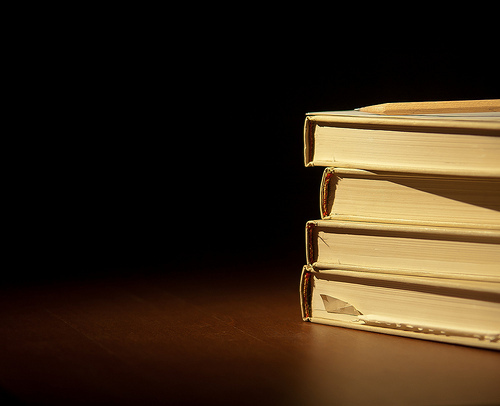
Books, a photo by shutterhacks on Flickr.
So this week on my Facebook author page I asked readers what they wanted me to talk about on this blog, and this was one of the first suggestions: how did I get published? Warning: my experience is not typical.
I wrote my first published novel, DO UNTO OTHERS, while working full-time. I had written an earlier novel that I wasn't really happy with, and I'd decided to try something new, with an entirely new character and a small-town setting. I decided to attend a writers' conference being held at my alma mater, Rice University, and noticed they had a manuscript contest where you could submit the first chapter of a book to a panel of published authors who served as judges.
No cash prize, no meeting with an agent, just a certificate of awesomeness. I figured I could write one chapter and see what kind of response I got.
So I wrote the chapter, about a young man who'd taken over the librarian job in his hometown after coming home to help take care of an Alzheimer's afflicted parent, who finds the murdered body of a book burner in his library, and sent it off.
To my shock, I won the manuscript contest.
"You should really send this in to New York," one of the judges told me.
"I, uh, only have the one chapter," I said.
"Well then you should finish it."
So I did. Armed with a bit of self-confidence, I went back and wrote the book over the next several months. Now at this point, with the book finished AND polished, I started querying agents. So I did, and I wasn't really getting anywhere. I had been going to conferences, and had befriended some published writers, but hadn't asked them to recommend me to their agents. I just hadn't; I didn't want to impose on the friendships. And it's sort of like asking a new friend, hey can you get me a job at your company? It just wasn't my style, so I had researched agents through Writers' Market and had a small list I was approaching. I had queried about four agents, with no luck, when I saw that two mystery editors–one from St Martin's, one from Ballantine/Random House–were going to be at a mystery writers' conference in Austin that I would be attending.
As Baldrick liked to say on the classic Blackadder comedy series: "I have a cunning plan." I did a little research and found out both editors, while based in New York, grew up in the South. And here I was writing a small Southern town mystery. I thought, just thought, maybe I could get either of them to commit to looking at sample chapters if I got a chance to meet them, wasn't pushy about asking, and followed up with a letter to them.
As it turned out, my friendship with one author got me on a panel talking about true crime in the South–even though I wasn't a published author. One of the editors was in the audience and later told me I was funny. The second editor sat next to me (I engineered this–cunning!) at a dinner. I told her I was writing a book BUT this is key: I didn't pitch it to her. Not at all. I thought it would be bad form to pitch her while she was a captive audience at a dinner. Instead we talked about books we loved.
So I'd met both editors, they knew I had finished a manuscript, but I had not pitched it to either of them or even asked if I could send them sample chapters.
The last night of the conference, I was in the bar, and both editors were there, each drinking a beer, sitting at separate tables with authors. Urged on by a published friend, I approached each of them as their groups broke up, thanked them for coming to the conference, and asked if I could send them the first three chapters of the book. Both immediately said yes, but to send the entire manuscript. This could have been to get rid of me, or it could have been that I hadn't been pressing the book on them for the last three days. I hadn't been a pest, so why not say yes?
So. I sent off the manuscript. Six weeks later, on a Friday, I came home late from a post-work happy hour to discover a voice message from one of the editors: "I want to congratulate you on your book, I'll give you a call on Monday." The most analytical weekend of my life followed; a published friend said, "He's not calling you to REJECT it." Which I thought was true, but I also wasn't quite ready to say he's going to offer me a deal. Maybe he wanted a rewrite before an offer; maybe he wanted to turn it down but ask me to send him the next book I wrote. I didn't know.
On Monday the editor called me again. He wanted to offer on the book. The next day the other editor called; she also wanted to offer on the book. I was beyond stunned. At this point, I did indeed ask my published friends to recommend their agents and they were very happy to do so. I interviewed several agents on the phone; when you have two offers in hand from publishers, it is going to be easier to get representation, but at the same time I wanted to make a good choice, not a fast one. To my surprise, some agents still would not return my phone calls even though I had multiple offers in hand. (and yes, I still remember their names–did they think I was lying? I'll never know). I did find an agent, and then I accepted one of the offers (which said agent negotiated into a two-book deal).
So. That's how I got published. I don't know if I would recommend this approach for everyone, but there are three key points to remember:
I acted like a professional before I was oneI did not pester anyone for help until I had sound reasonI had a finished, polished manuscriptThose points still apply today, even with all the massive changes in the publishing business.
March 21, 2011
The Organized Writer: Benjamin Franklin's daily schedule
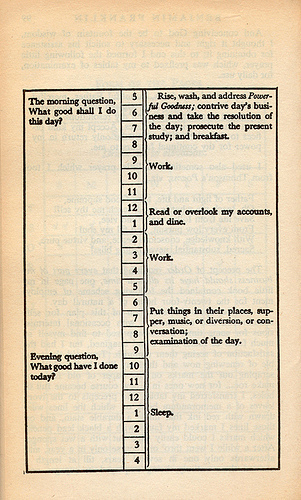
Benjamin Franklin's daily schedule a photo by nickbilton on Flickr.
I love this. Think of what all Benjamin Franklin accomplished in his life: writer, inventor, diplomat, advisor, publisher, and more — and you see how the rigor of his daily schedule made that amount and variety of work possible. to repeat: I LOVE THIS.
Have you mapped out your creative work today?
February 22, 2011
Announcing Panic: The Ultimate Edition
I am thrilled to announce that my first young adult novel will be published in the UK on July 7, 2011 by Atom Books/LittleBrown UK. For my first book for teens, I have taken one of my most popular novels, Panic, and transformed its hero, Evan Casher, into a sixteen-year old boy. Evan is a student who discovers that everything in his life–his parents, his girlfriend, his worst enemy–is a lie. I had a fantastic time reimagining the world of Panic (which has sold over 400,000 copies in the UK). PANIC: THE ULTIMATE EDITION is a book rewritten from the ground up–with new villains, new dangers, and new challenges. Now Evan Casher is a desperate but brave teenager fighting to avenge his mother, save his father, and discover the truth about his life.
I'll have much more to say about PANIC: THE ULTIMATE EDITION in the weeks to come, but know that those in the UK can preorder it from their local or online bookstores. I don't know when there will be a release date yet for the US or other countries, but I'll be sure and keep you informed. I'm really excited about this book and I hope you will be, too. Thanks! Here's the preliminary cover flat:
February 9, 2011
Swallowing My Own Medicine
This week I talked about how to break through a block. And (wait for it. . .)
Today I got blocked.
Hello irony! How could I be blocked? I have an outline for this book crammed full of good ideas. And today, that was part of the problem.
Indecision Is A Block
I was not as much blocked as indecisive. I reached a juncture in the book where I had to make a very serious choice. I had about four options to pursue; think of it as more than one fork in the road. Instead of a barren desert, I had a flood of ideas. (I know. Poor me. But this is a block, too, when you can't choose.)
It took me about an hour to realize I was blocked–that I was stuck in indecision. Well, a decision will surface, I thought. I did some background reading I had wanted to finish. I did some research. I answered a few emails. Smell the procrastination!
Heal Thyself
It was 20 degrees and sleeting, so I didn't embrace my usual cure of a walk. Instead I went to the notebook I keep and I started writing out the pros and cons of the decision. It seemed a rather dry approach and wasn't helping. So I went back to the characters (as per my own advice) and started staring them down. After about ten minutes of thinking hard I realized that I needed to cut an element about one of the major characters in the book: It wasn't working, it was derailing the book's logic, and it was–and this is important–it was overloading the book. A really clever twist shouldn't cripple the rest of the story. And in this case, it was. So. out it goes. That simplified the rest of the decisions to make at this point of the book, and frankly I felt like I'd been freed from a ball and chain. It's an interesting idea for a character–but best saved for another book.
All this proves that a surfeit of ideas can be as problematic as a lack of them.
Photo credit, aussiegall
February 7, 2011
MyFive: Ways to Break a Creative Block
I don't experience writer's block often (and some writers claim to never have it) but I think there are times when every creative person needs a jolt of inspiration. Here are five very simple approaches I take if my brain seems mired or needs some fuel (some apply to the initial idea stage, some to when you're already writing but then get stuck):
1. Take a walk. I know this sounds way too simple to be true, but getting up out of the chair, away from the computer or the notebook, and walking in silence is a consistent and reliable way to jar loose an idea from the mud of your brain or sort out a story tangle. Get yourself some fresh air, get your blood moving. In my experience this is the best method of these five. Quiet+exercise+change of scenery+thinking about your problem=goodness.
2. Read what you've already written. Sit down, preferably with a printout of your work, and read through it. And rather than tearing it apart because you're feeling blocked, look at what's working in it. Where are its strengths? Can you build on those strong passages or ideas? Who are the characters who are working? What more can you do with them? Look at the foundation that you've built; if it's strong, you'll find inspiration in what you're doing right. If it's wrong, then work on fixing the weaknesses. If one of your scenes seems tired or uninteresting, then rewrite it. Just doing a bit of rewriting can spark new ideas for future scenes. The main point here is to get writing again.
3. Look at your characters. I can only speak for myself, but I find when there is a block in a story, it often goes back to characters. I either have them being too passive, or I'm trying to force them to take actions not true to them, or I don't understand their motivations. Characters drive stories. Get to know them better when you're blocked. Do something horrible to your hero or heroine. Imagine the worst. Up the stakes for them. Write that scene. It may not come next in the book, but write it and think how you can work toward it. If you're dry for any idea for a character, ask yourself: who fascinates you? Who else would you want to be for a day? Write about that person. Just write a page. The genesis of a character may start.
4. Break it down. Sometimes the problem is one of structure. Write out your summations of your scenes on index cards, or in an outline. Arrange the scenes in the best order for the story. If you look at your story through the lens of a traditional three-act structure (you can get a good description of this in Christopher Vogler's The Writer's Journey), what would be the next step in your story? Even if that's not the scene you want to write–write it. It may open up your mind to new possibilities. Imagine the same story told from your antagonist's point of view; how would it be different? Write a scene from that perspective. You may never use it, but it can show you new angles to explore. If just looking at your story from "on high" this way doesn't help, then shuffle and rearrange the scenes. Does that spur some new ideas for new scenes, or new drama for your characters?
If you're not writing, but rather trying to come up with an idea, just start scribbling down ideas on the cards. Every stupid, random idea allowed. Scribble anything that comes into your mind and do this for twenty minutes. When you're done, group the best ideas together on the table. How can these ideas be connected or combined in an interesting way? If you want to throw these ideas away, ask yourself why before you dump them in the trash can. Is there any variant or inversion on this idea that might interest you?
Another way to break it down is to sit with a piece of paper and ask yourself: why am I blocked? Why is this story not working? Inside, we often know but we don't want to say, because the answer will involve work. Be honest. Have a dialogue with yourself. You may have to kill dysfunctional scenes or unworkable subplots or ill-concieved characters that you love, but that are just not contributing to this story. Write out the question and write out possible answers. The answer that breaks your block, expressed in this unexpected way, often appears quickly.
5. Take a break. I have never gotten a great idea from trying to force one to come. And let's be honest: there's pressure. My ideas are how I feed my family and keep a roof over our heads. But If I sit there and try to think of an idea, it won't work. Don't prod your subconscious. Step away from the desk, and let your mind alone. The previous suggestion for a walk is best when you have a problem to disentangle, but if you need a new idea, let your brain be. Go pull weeds. Stroll through an art museum and look at pictures. Watch a favorite film. Doodle. Scrub a floor. Go take a shower (I came up with the idea of Panic in the shower.) Trick your brain into not thinking about your problem, and you'd be surprised how quickly it will go back to work, unbidden.
February 3, 2011
Where Would You Learn About a New Series?
This is stemming from a discussion I started on my Facebook reader page. The Sam Capra novels are getting ready to launch this summer in the United States. If you're interested in learning more about the books, where would you like to go on the web to know more? Would you:
1) prefer Sam have his own website, where we learn about his character, the bars he owns, the cast of characters, the books, with additional content (like a weekly video blog on cocktails)
2) prefer Sam have his own web section at jeffabbott.com
3) prefer Sam have a Facebook fan page, with links to and from my Facebook reader page. There might have to be less content on a fan page.
We have so many choices now as to discover content on the web. Tell me what you think in the comments section, either here or on the Facebook reader page (link above).
Thanks!
January 26, 2011
The Organized Writer: My Novel's Notebook
I love notebooks. I do. My favorites for pure out just writing drafts are Clairefontaines, which I've blogged about before. But since they're spiral, they're not as flexible as a three-ring binder. But three-rings are kind of bulky. i found the perfect solution for flexibility with Levenger's Circa notebooks.
Several of my writer friends had praised Circa notebooks to the skies to me, but I resisted because they are a bit expensive. However, Levenger offers a "test" package of Circa goods that includes a $40 gift card, so it's not too expensive to give Circa a try.
Circa's basic idea is that you have a notebook with a set of small discs, and paper cut to fit in the discs. You can easily move and rearrange pages to suit your need, and use different kinds of paper and different inserts to suit your needs. If you buy a Circa punch, you can then add anything to your notebook: spreadsheets, emails, maps, clippings from magazines, articles printed from the web, outlines from Tinderbox, etc.
I use a Circa to keep all my notes for a book. I use a black clothcovered Circa, with the slightly larger Kyoto colored disks. I like having a "nicer" notebook for the current book.
In the front I keep a Circa ziploc for clippings or images (empty at the moment). But let's say I'm on a research trip to London to explore settings. I could keep pamphlets, guides, menus, any paper I pick up right here in this packet with the rest of my research.
And holders for blank index cards
I use the 2-inch Durable Index Tabs from 3M to set up sections as follows. Not the greatest picture, but you just attach the adhesive, easily removable tabs from the pages:
Hopefully you can see my sections for the current book include:
Characters – here I write notes/thoughts/bios of all my characters; include emails discussions with my editors on characters; photos or images of people who could resemble a character; I also keep notes about locales here, because that is where the characters live. I could have that as a separate section but I don't.
Plot–notes and thoughts on plot ideas and issues. Thoughts on choreographing action scenes; thoughts on emotional impact scenes. I would keep a running outline of the book in this section also, either in the form of a spreadsheet or a Tinderbox outline. Notes and brainstorming on subplots, as well. Emails of discussions of plot points with my editors. Thoughts on McGuffins and motivations. Lists of questions and issues that must be resolved in the book.
Research–notes on anything I don't know that I need to know. Great place to print out web and magazines articles, keep notes from books I read for research, lists of research questions I must still answer.
Imagery–thoughts on the images that will recur in the book. I don't have a lot of symbolism in my novels, but I do have recurrent images that I do use for effect. This is where I try to do my meta-thinking about the book; what does the book say, beyond the thrills and the action? This is also where I keep a list of potential titles.
Ideas–this is where I keep stuff that doesn't quite fit into the other slots, or where I have ideas for future novels that don't yet have their own notebook. I keep articles in here too that I find inspirational, that I want to have always to refer to when I'm thinking about a book. For example, a great article on the value of mystery in storytelling by JJ Abrams:
For another example, I had a foundation-changing idea for this new book that I had to really think about how to incorporate: it alters everything–and the whole email discussion I had with my editor about it is kept here, always at hand when I'm writing. Random ideas here that may not yet fit properly into the book. This section gets processed a lot, meaning that ideas get transferred and then further fleshed out in the other sections.
I archive old book notes in a much cheaper Circa notebook, one with plastic covers.
I prefer this approach for keeping my book notes. I tried once to keep my notes in Scrivener, along with the manuscript, but I discovered that I don't look at my notes very much if they're in electronic form. Paper puts them there, in front of me. I am much more likely to review them, to go back through them, than if they are stored somewhere. There has been an argument made that paper is simply better for this kind of work than digital, as the paper can be a physical representation of thoughts and plans: your mileage may of course vary. It's also easier to jot down a note in this notebook, late at night–no starting up the computer.
The drawback of Circa (which is compatible with the less expensive Rollabind system) is the cost. That said, this is how I make my living, so using Circa is worth it to me.
January 20, 2011
MyFive: 5 Great Soundtracks for Writing
A new regular feature of this blog is going to be MyFive — a list of five things that I like or love or find helpful to me in my life or my work, and why.
I'm going to start with something that colors my work day, and that's music. I listen to music while I write, and I have pretty wide-ranging tastes. I like everything from classical to jazz to rock. But one of my favorite genres of music for writing is the film soundtrack. Soundtracks mirror the structure of a story: moments of huge drama, quiet, intensity, love, and confrontation. There are certain soundtracks I have turned to again and again for inspiration while I write, and it was extremely hard to limit it to five. (I can see writing a runner's-up list here as well.)
Henry V by Patrick Doyle. Kenneth Branagh's production of Shakespeare's Henry V is one of my favorite films. I know people who are not big into Shakespeare who loved this movie, too. And one of the many elements that worked so well in the film is the music. It's hard to believe this was Patrick Doyle's first soundtrack score–it is remarkably assured. It captures the young king's confidence, the high stakes of his rash invasion of France, the warmth of his friendships, the burden of the crown, and the brutal action of Agincourt.
Lost by Michael Giacchino. I'm not going to break down the soundtracks by season; I'm going to consider all six seasons (and the separate finale soundtrack) as one epic work. I think this is the best television soundtrack of all time. Very few television shows bother with a full orchestral soundtrack, but Lost did, as the show morphed from a survival story about plane crash survivors to an examination of a set of damaged characters seeking redemption inside the secret heart of the world. It was a grand, sweeping story that required music to match. No matter your feelings on the show–whether you embraced Lost's mysteries or thought the show took too many turns for its own good–few television soundtracks lent so much power and distinctiveness to a show's feel. The music managed to create a palpable sense of intrigue, of suspense, of joy, of loss. And it gave the show's mysterious island its own extraordinary sense of character–most soundtracks don't quite pay as much attention to locale as Lost does. The track "Oceanic 815″ on the first season soundtrack, with its piano solo and accompanying orchestra, is completely compelling, encapsulating fear, loss, and hope in six stunning minutes. I also love Giacchino's work on Alias and Star Trek, but his score for Lost stands alone. All the seasons, and the finale soundtrack, add up to over 12 hours of stunning music.
Oldboy by Cho Young-Wuk. This astonishing Korean film about one man's violent revenge on the people who kept him captive in a single room for fifteen years –for unknown reasons–runs the gamut from a light and airy waltz to dark orchestral themes of loss and vengeance. All the tracks are named after films: from 'The Searchers' to "For Whom the Bell Tolls' to 'The Big Sleep'. I was halfway through watching the film for the first time and was already looking to see if the soundtrack was on iTunes. One of the most emotional soundtracks ever for a crime film. The high-minded orchestral treatment is a direct contrast to the violence of the film (it's not for the squeamish). It does an extraordinary job of conveying those huge moments of tragedy, when past and present collide.
The Bourne Films by John Powell. The reimagining of Robert Ludlum's Bourne novels–updated for modern times, and a modern sensibility about what an action film should be–was greatly enhanced by John Powell's scores for all three films. He manages to evoke Bourne's sense of disconnection, of loss, of not knowing who he is, while tying it to some of the best action themes ever written. An example: "Bim-Bam-Smash" from The Bourne Supremacy is a nearly perfect car chase theme; and is immediately followed by a bittersweet theme in "Atonement", when Bourne must face someone whose life he has ruined. All three are action soundtracks, but full of true emotional beats.
The Hours by Philip Glass. This was one of those films I didn't particularly think I would enjoy and ended up really liking, and a big part of being won over was Glass's terrific score. Some find Glass too repetitive; I actually think his music works fantastically well for background while writing, because the static rhythms don't change instantly, the progression is steady but slow, like words appearing on the screen. One of the challenges of this soundtrack was one usually found only in novels: three characters, in three different time periods. Glass's music works for the 1920s, the 1950s, and the the turn of the 21st century. It is thoughtful, rich, emotional music, and although my books are rather different from The Hours I always love writing to this soundtrack.
I have many more soundtracks I love, and it was hard to limit to just five. I'll have to post another set of five in a MyFive entry weeks to come.
January 18, 2011
The Organized Writer: A Creative Planner
I want to keep my working brain mostly stuffed with ideas for books. So I get all the everyday stuff out of my brain and into a planner. I use a Filofax as my portable brain.
I've tried the electronic-style planners and for some reason paper just works better for me. I don't have to worry about maintaining a sync, I don't have to worry about lost data. I can look at multiple pages at the same time. Also, I can doodle in it. Never underestimate the power of doodling.
In my Classic A5 Filofax (this is one of the larger sizes, but they have ones that are smaller if you like) I keep my calendar, my to-do lists (of which I gave a sample of in a previous blog), my project notes (which are different than book notes, this is more for nonbook work or books/stories that are only sparks of ideas yet or for lists of books to read or movies to see or to-dos that are related to a specific project). I really try to keep the Filofax simple.
I use the week on one page calendar, with a facing page for notes. Each week I put on the Notes page what I want to get done, using the project notes (which are often just a really long todo list) as a guide. And of course I add things as the week goes on and new issues crop up. This way I don't have to do lots of rewriting of a to-do list. I don't need tons of space for each day, just appointments and writing down word count for my own benefit. This is from a few weeks ago, when I was working on galleys and spending vacation time with my family.
I also have a full, foldout year calendar where I can record the day's word count and mark due dates so I can visually see my progress over time and have my freakout panic attacks in an orderly fashion. (this is not filled out yet, I have to do that this week).
In the leather slots on the inside cover, I have notecards and coffee shop frequent user cards and gift cards. (COFFEE. It's important.)
I have a Ziploc-style bag where I can put in inspiring images a la Gala Darling's Filofax (her blog describing her setup for a creative person's Filofax caused a complete sellout of her style of planner for weeks), or have notecards at hand or keep my Southwest cocktail coupons. Today's inspiration is a Drew Brees trading card my sons gave me, to never give up, because Drew never gives up. I've also put in family photos or sketches on notecards that remind me or rally me to do my best work. I know this will seem silly, and I'm not the kind for a lot of affirmations, but a little visual reminder to hang tough or to feel inspired never hurts.
I have five tabs in mine, behind the calendar. Projects, Do, Ideas, Lists, Maybe, and Reference.
Projects lists everything I'm working on.
Do is what has to be done to make those projects complete.
Ideas are any ideas I have, maybe for new projects, new books, new stories, new features for the website, and so on.
Maybe is for items that are a bit beyond the idea stage; maybe I'll want to do them, one day, but not now. Keeping notes here on them makes sure I don't lose any good ideas related to them.
Reference is reminders/data that are useful to have: when did I last have the car serviced and what was done, if I have to call Apple about my computer, here are the notes for it; expenses for when I'm on book tour, etc.
I keep blank paper in it always for notes. Mine is an A5, so it's bigger, and usually stays on my desk. It is not so big, though, that I can't take it with me.
My wife asked for a Filofax for her birthday, and she loves hers so far. She needs much more space for her calendar than I do, and so she uses the one week spread across two pages format. This is the beauty of Filofax; you can make it work the way you want to work.
If you like a bound planner, instead of a loose-leaf one, Quo Vadis and Moleskine make very good products. I think the important thing is to pick one and stick with it and make it the best repository for your schedule, your work, and your random ideas that it can be. I like the Filofax because it's flexible and easy to maintain. It lets me get my head clear to do my best work.
Next up: how I use Circa notebooks for all my book notes: tracking characters, plot, imagery, research, random ideas, and more.

